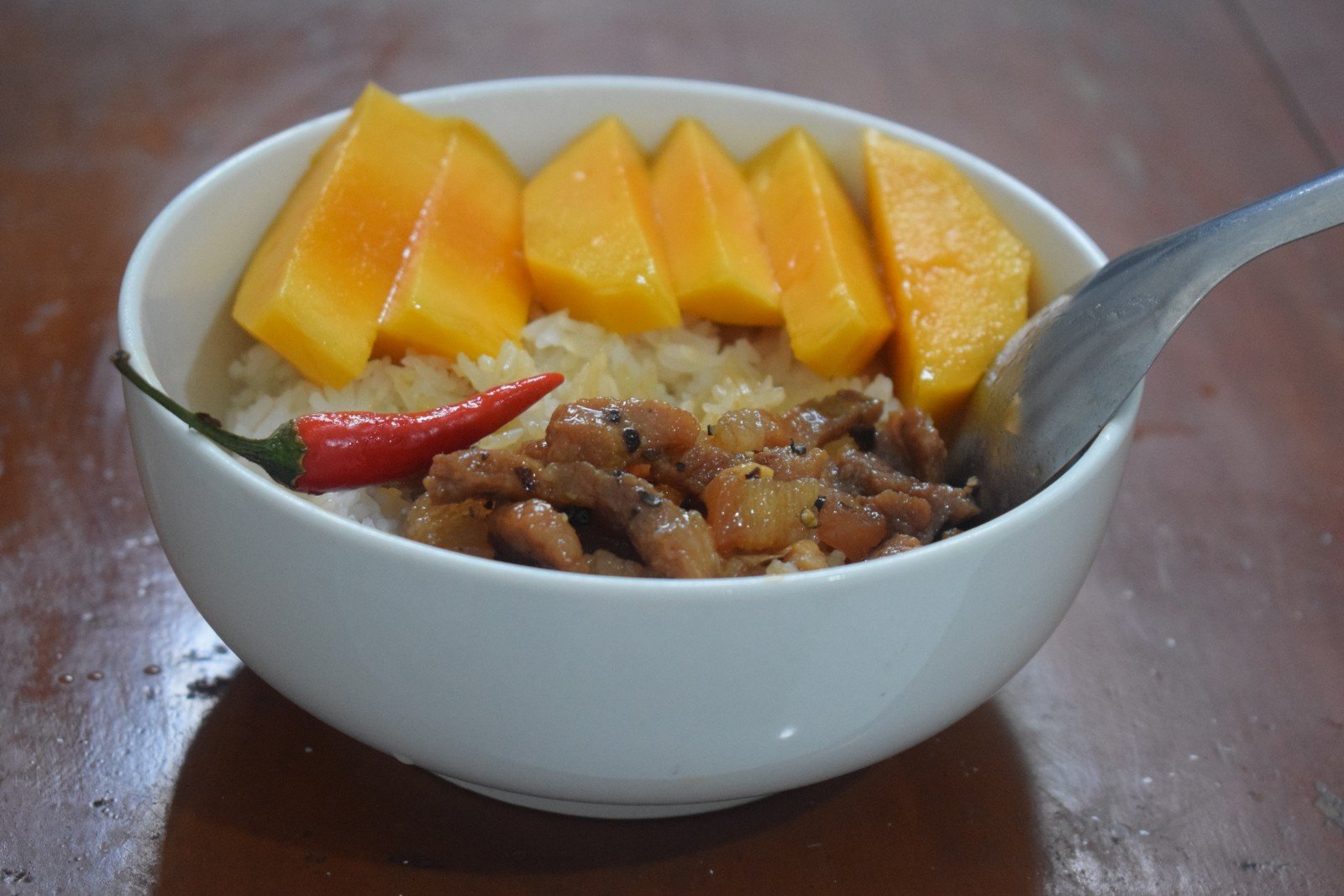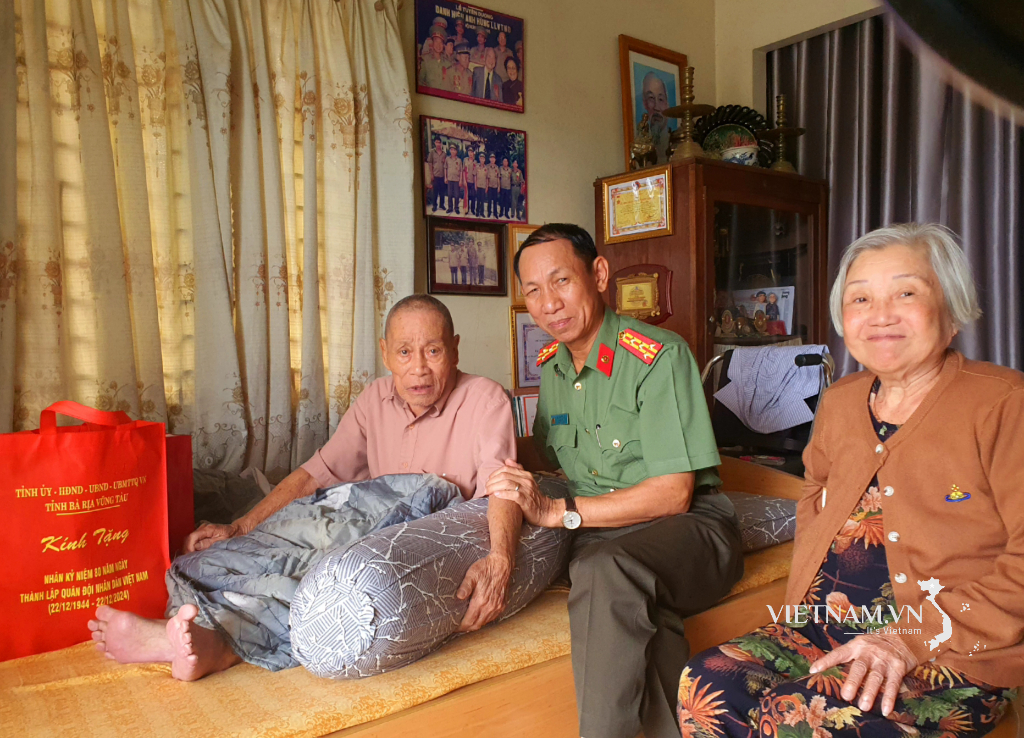In my childhood memories, lying in a hammock on summer afternoons, listening to the wind rustling banana leaves, the coconut trees swaying, and my grandmother slowly chewing her rice, brought an unusual sense of peace. I still clearly remember my grandmother's small figure, her sun-tanned face marked by time, her calloused hands faintly smelling of kitchen smoke and coconut leaves. She would often sit at the table, eating rice with ripe mangoes and spicy braised fish. The first time I saw her, I asked in surprise, "Grandma, why do you eat like that?" My grandmother smiled gently, her eyes reflecting a whole life story: "We're poor, we eat whatever we have. It's simple, but delicious!"
A simple meal consisting of a few fried dried fish and a plate of watermelon. Photo: TU MINH
Following my grandmother's recommendation, I started eating it, and unexpectedly, it gradually became my favorite dish. The soft, sweet ripe mangoes blended with the chewy white rice made my heart feel light, like floating on a cool breeze. That feeling wasn't just about taste; it was also about the warmth of family affection and cherished memories.
Ripe bananas and watermelons are also often eaten with rice. It might sound strange, but the savory flavor of braised fish, the refreshing sweetness of the fruit, and the nutty taste of the rice combine to create a unique, rich flavor reminiscent of home. Soft, sweet ripe bananas, eaten with rice drizzled with salty soy sauce and a touch of spicy chili, make for a simple yet incredibly delicious meal. Juicy, sweet watermelons, when eaten with rice, are even more refreshing and pleasant, especially on hot summer days.
My grandmother once explained that rice from the Mekong Delta is naturally sticky and slightly dry, so when eaten with juicy fruits that have a tangy or sweet taste, it's easy to swallow and not cloying. These fruits, readily available in the home garden, become "close companions" on the daily dinner table. People in the Mekong Delta eat this way not because it's "unusual," but because of affection – affection for the land, the people, and the simplicity of the meal. This simple way of eating reflects a peaceful, simple, and unpretentious way of life.
Rice served with mango is a favorite dish among many people in the rural areas of the Mekong Delta. Photo: TU MINH
On days when there was no soup, my grandmother would call Uncle Ut to the garden to pick coconuts, chop them open, and pour the coconut water over the rice. The sweet, cool coconut water soaked into the rice, making it softer and more fragrant. Add a piece of grilled dried fish, slightly charred and spicy with chili, and that was enough for a hearty lunch in the kitchen, full of rustic charm. A friend once remarked that people from the Mekong Delta like sweetness, from their food to their way of speaking and showing affection. But that sweetness isn't just a taste on the tongue; it permeates their way of life, their sincere feelings—sweet without being cloying, honest and tender.
My mother also enjoyed eating rice with fruit. I once asked her, "Why don't you eat properly, with all the dishes: soup, stew, and stir-fry?" She smiled, chewed a piece of rice mixed with banana, and said, "If there's fish or meat, I eat it; if not, I pour coconut milk over it and eat it with fruit. As long as it tastes good, that's all that matters. No one's going to eat it for me, so why bother with fancy dishes?" When I was little, I didn't understand. Later, when I grew up and traveled far, I realized that the best thing isn't the food itself, but who you're eating with and whether your heart is at peace in that moment.
A friend in Rach Gia ward once laughed: "Rice with fruit? Both rustic and adorable!" To those unfamiliar with it, eating rice with coconut milk or fruit might sound strange. But for people in the Mekong Delta, it's part of their identity, a habit formed from days of poverty, from years spent working in the fields and orchards. A meal with just a little coconut milk and a few slices of fruit is enough to satisfy hunger; it's not elaborate or extravagant, but it's heartwarming.
Today, many people in the Mekong Delta still have the habit of eating rice with fruit. They maintain this way of eating not because of poverty, but because they miss the taste of their homeland, preserving their memories and roots. Occasionally, I also recreate that "unusual" meal. My child looks at me with surprise and asks, "Mom, what kind of strange way is that to eat?" I just smile, because there are simple things that cannot be explained in words, only felt with the heart. There are simple dishes that nurture us into who we are. And there are simple memories that nourish us throughout our lives.
TU MINH
Source: https://baoangiang.com.vn/kieu-an-com-la-doi-dam-chat-mien-tay-a461840.html






































































































![OCOP during Tet season: [Part 3] Ultra-thin rice paper takes off.](/_next/image?url=https%3A%2F%2Fvphoto.vietnam.vn%2Fthumb%2F402x226%2Fvietnam%2Fresource%2FIMAGE%2F2026%2F01%2F28%2F1769562783429_004-194121_651-081010.jpeg&w=3840&q=75)







Comment (0)